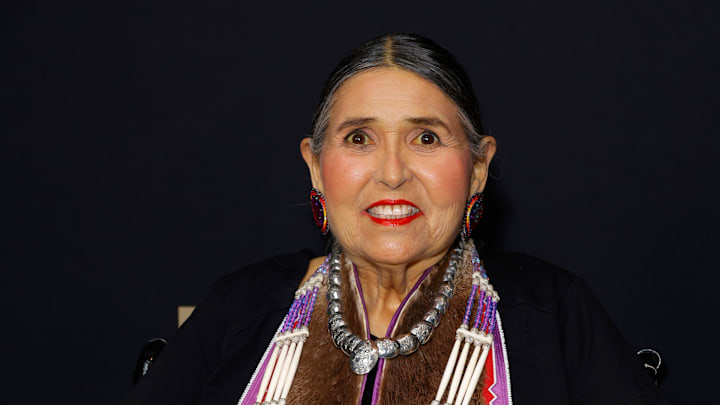Sacheen Littlefeather caused a national stir on March 27, 1973, when she climbed the stairs to the stage at the Dorothy Chandler Pavilion in a buckskin dress and moccasins to refuse Marlon Brando’s Oscar for Best Actor in The Godfather at the 45th Academy Awards.
“I’m representing Marlon Brando this evening, and he asked me to tell you … that he very regretfully cannot accept this very generous award,” the 26-year-old explained. “And the reasons for this being are the treatment of American Indians today by the film industry.”
The crowd of Hollywood heavyweights reacted with jeers as Littlefeather finished delivering her short speech and quietly exited the theater, leaving behind an ugly image of intolerance that endured in Oscar history for decades.
In June, nearly a half-century after that infamous evening, the Academy of Motion Picture Arts and Sciences issued a formal apology to Littlefeather for the poor treatment she received at the ceremony. The belated mea culpa arrived not a moment too soon, for on Monday, October 3, Littlefeather died at the age of 75.
Hollywood's “Clorox Factory”
Born Marie Cruz in Salinas, California, the actress and activist adopted the name Sacheen Littlefeather in her teen years to honor her Indigenous heritage—Apache and Yaqui, through her father Manuel. Littlefeather wanted to act, but struggled to find consistent work in Hollywood. At the time of her death, she had only seven film credits to her name, two of which were for unnamed characters.
“I got a few jobs with Italian film crews, because in those days I was considered exotic, and that meant that you didn’t get employment very often,” she told Academy Museum of Motion Pictures president Jacqueline Stewart on the And the Oscar Goes To… podcast in August. “There was job discrimination, and the movie industry basically looked like a Clorox factory. It was so white, it was ridiculous.”
Littlefeather’s proximity to Hollywood, however, meant that she at one point counted Francis Ford Coppola, the director of The Godfather series, as her neighbor. With his help, she was able to send a letter to Brando, who had caught her attention through his support of Native American rights—most notably, he was arrested at a 1964 “fish-in” in Washington state. Brando called her to discuss the letter, and a friendship was born.
Through phone calls and visits to Brando’s home, the pair discussed the growing movement for Indigenous civil rights, of which Littlefeather was an active participant. She led the Affirmative Image Committee, a group protesting “savage” depictions of Native Americans in movies and television, and supported the Indigenous occupation of Alcatraz from 1969 to 1971, as well as the occupation of Wounded Knee just weeks prior to the Oscars. This activism informed Littlefeather’s eventual Oscar speech, which was not the eight-page opus Brando had given to her, but her own words. “I spoke from my heart, because the heart and the heartbeat is the voice of all Indigenous people everywhere,” she told Stewart.
“Unacknowledged” Courage

Unfortunately, many were hostile to those heartfelt words. Littlefeather and Oscars director Marty Pasetta have both claimed that Western star John Wayne tried to charge the stage, though some historians counter that he probably just yelled. According to Littlefeather, she was also effectively blackballed from the industry following her appearance. Hurtful rumors swirled that she wasn’t even Apache, and had rented her dress for a mere publicity stunt.
The Academy attempted to acknowledge the wide-ranging damage in its apology, published in The Hollywood Reporter in August. “The abuse you endured because of [your] statement was unwarranted and unjustified,” it read. “The emotional burden you have lived through and the cost to your own career in our industry are irreparable. For too long the courage you showed has been unacknowledged. For this, we offer both our deepest apologies and our sincere admiration.”
The apology was followed by a special event honoring Littlefeather and her legacy at the Academy Museum on September 17. Her photo now hangs inside the museum, beside a picture of Sidney Poitier accepting his historic Oscar for Best Actor.
“In 1973, I fulfilled the request of a friend and an ally,” she said at the Academy event. “I knew the impact and the importance of representing all native people that night.”
“When I am gone, always be reminded that whenever you stand for your truth, you will be keeping my voice and the voices of our nations and our people alive.”
